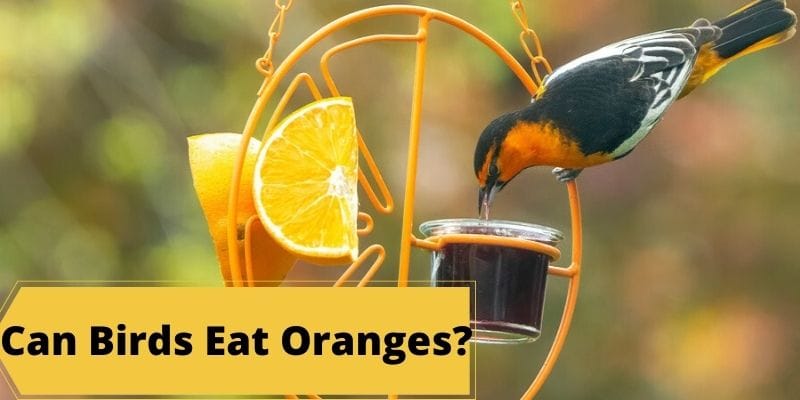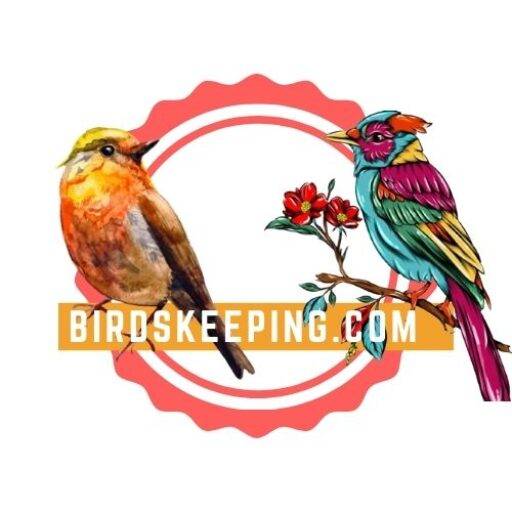You might have seen birds eating apples and other fresh fruits, and you may think, can birds eat oranges?
The quick answer to this question is Yes! Birds can eat oranges, and they enjoy eating oranges. But roughly feeding oranges to them is not just the thing, and you have to care about this. Read more about this below and understand how you can do it properly.
- Are Oranges Safe For birds?
- Do Birds Like Eating Oranges?
- Do Birds Eat Orange Peels?
- How To Serve Oranges To Birds?
- Do Birds Eat Oranges In The Winter?
- Do Birds Eat Dried Oranges?
- What Birds Will Eat Oranges?
- Final Words
Are Oranges Safe For birds?
Orange is a fresh fruit containing a lot of nutrients. The presence of vitamin C, vitamin A, calcium, proteins, and other nutrients make orange one of the healthiest fruits. But the question arises, is orange safe for birds?

The direct answer to this question is, yes, it is safe to feed oranges to birds. The presence of vitamin C in oranges helps boost birds’ immunity. Oranges may provide resistance to your birds against illness, and it helps to improve their health.
You should keep one thing in mind whenever you are feeding oranges to birds.
Can Birds Eat Strawberries?
You should not provide oranges to birds on a regular basis and keep them once a week or two to three times a week because the citrus present in oranges can affect the digestion of birds by increasing the absorption of iron.
Do Birds Like Eating Oranges?
They love to eat fresh foods, and they usually have fresh fruits in the wild, just like birds can eat apples.
You Might Also Like: Can Cockatiels eat Oranges?
Orange is one of the fresh fruits you can offer birds. Hence, birds like to have oranges. They can quickly eat oranges, and they will be benefited from the nutrition present in oranges.
They also like to have orange juice while eating food. Fruits containing citrus are the favorite of parrots, and orange is one of those fruits.
You can offer them orange juice when you are feeding the birds, or you can also feed slices of oranges to birds but make sure that you are not overfeeding oranges to birds.
Birds prefer to eat the soft inner portion of the orange as we like to eat. So, try to peel off the orange before giving it to the birds.
Do Birds Eat Orange Peels?
Orange peels are the outer part of the orange. Usually, birds like to eat the soft inner part of the orange just like we want to eat. But the question that comes to our mind is, can birds eat orange peels?
The answer to this question can not be given directly. Birds can eat the peels of oranges, but at first, they will avoid eating peels.
So, you have to try creative ways to feed bird peel to the birds. Once they taste it, then they can manage to eat the peels.
But you have to be cautious if you are going to feed the orange peels to birds. Because the oranges that we buy from supermarkets or local stores are not 100% organic or cannot guarantee whether oranges are organic, but don’t feed the orange peels if the oranges are not organic.
Usually, the oranges that we buy from offline stores are not organic. The tricky part is that pesticides may be used, or the color you observe may be artificial.
That’s why if you are not sure if the orange is organic or not, then do not feed orange peels to birds.
How To Serve Oranges To Birds?
Serving orange the birds as their food is not a difficult task to do. Maybe you have placed some pieces of oranges for feeding the birds in the past. But that could not be a perfect way to feed oranges to birds.
How To Feed Oranges To Birds?
There may be a lot of ways to feed oranges to birds. But you can choose any one of them given below, and you can follow all the ways to check which one will be best for birds in your experience.
By slicing the oranges, you can help the birds take them inside their mouth easily and consume the slices of oranges.
Slices between 4 to 6 mm in size could be better for birds. These slices should be the same as you do with apples or tomatoes.
Place the slices on platforms so birds will be attracted to these slices of orange and enjoy these slices.
You can cut the oranges into two parts and offer both parts for eating. In this way, birds will eat the orange as they want because you need to place both the cut parts on the feeder table, and birds will eat in their way.
Also, you can offer orange juice to birds when they eat their food, and this would be tastier for birds. Small pieces of orange in the water for birds are also an excellent way to serve oranges to birds.
Do Birds Eat Oranges In The Winter?
Yes! Birds can eat oranges in winter, and most of the birds who eat oranges usually like to have them in winter rather than summer. Birds will benefit from the vitamin C present in the orange, especially during the winter season.
Those birds who like to eat oranges in winter can avoid oranges from eating during summer, and birds may choose seeds over oranges. Don’t be surprised if you will see that birds are not showing interest in oranges in summer.
Do Birds Eat Dried Oranges?
Feeding dry oranges to birds is a common question people ask. Mostly Dry fruits have sulfur dioxide, and orange is not an exceptional case, and this chemical compound is not suitable for birds’ health.
So the answer is birds can quickly eat the dried oranges, but you should make sure the oranges are freed from sulfur dioxide.
What Birds Will Eat Oranges?
Oranges are fresh fruits, and birds feed on oranges in the wild. Almost all birds can eat oranges, including parrots, brown thrashers, cockatiels, lovebirds, etc. Also, there are some famous birds that eat oranges, and you can read them in detail.
Final Words
It will be a good idea if you plan to feed an orange to birds, and birds will enjoy eating oranges, especially in winter. You can try this in different ways, such as orange juice and slices.
You can cut the orange in two halves and keep it on the platform without peeling it because the orange peel will help them while eating.
Follow me on
Birdskeeping is supported by its readers. When you purchase through links on our site, we may earn an affiliate commission. Also, as an Amazon affiliate, we earn from qualifying purchases without costing you extra.

